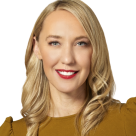The summer of 2020 was one of impassioned marches after the death of George Floyd in the U.S. sparked outrage — but also forced many to confront a deeply rooted problem ingrained in society: racism.

In Alberta, thousands lined the streets of Calgary in a powerful show of solidarity with a resounding message that enough is enough.
Adora Nwofor helped lead some of the marches.
“Lacombe and Innisfail and Cochrane and Red Deer,” she said, recalling the list of communities she’s rallied. “I think there was about eight.”
“I definitely got the steps in,” she says.
“To see lots of people marching, looking for answers trying to change how they live their lives, it was really emotional for me in a good way.”

In September, the born-and-raised Calgarian, who is also a stand-up comedian, became the president of the Black Lives Matter chapter in Calgary. She has been an advocate of defunding the police and re-allocating the money to those working on the frontlines of social and mental health issues.
“The police aren’t skilled in dealing with many things they face,” she said, while standing outside her parents’ home on a chilly February afternoon.
Calgary city council did vote on the motion to cut the police budget, but it was defeated in November 2020. Instead, more money was allocated to it and an anti-racism taskforce was set up.
In the months since then, the streets echoed with urgent calls for action, Nworfor said while money has started to be funneled to anti-racism, there’s has been a lot of push back, some directed straight at her.
“There’s a lot more people that are upset with me. There’s a lot of doxing going on,” she said.
Adora’s parents moved to Calgary in 1973. Her mom was from Jamaica, her dad from Nigeria. They came to Canada a month a part and met at a church in Calgary.
“Yes, that’s how it happened — at church,” Nwofor says, and she squeezed in between her parents during an interview on the front step of the house, her arms wrapped around both of them.

Get breaking National news
The Nwofors were both university students when they came to Canada and they both agree Calgary was a much different place at the time.
“When we came initially, nobody knew who Black people were,” said Osita Nwofor, who founded and was the first president of the Nigerian Canadian Association in Calgary.
“One teacher said to me, “Don’t expect the same treatment,'” Adaire Nwofor recalls. “Then I wondered what she meant. And you know today, I wonder if I could have gone back, I would of challenged her. But you know what I did then? I walked away crying. I was so naïve, I was so battered so bruised.”

“That happened to me when I came here to go to school,” added her husband. “Sometimes (teachers) were surprised at what I produced and questioned if I wrote it,” he said.
But it was wasn’t just in school that they would face discrimination. They said they’d never be able to live in a neighborhood like the one they are in now back in the 1970s.
“We have struggled and when you hear the kind of struggles some other people have endured, your heart breaks,” Adaire says. “In the ’70s, lawyers, doctors, engineers were cab drivers because there was nothing else for them. Nobody would accept them.”
The Nwofors said fostering a high self-esteem and confidence in their children was paramount.
“My parents taught me I should love myself, period,” Adora said. Her mother turns to face her and tells her how proud she is of her for being a voice for the voiceless.
Adora has been on the receiving end of racism herself, too many times to count. As such, she says she is constantly cognizant of the colour of her skin.
“White privilege is knowing that you never have to think about being white. You never have to think, ‘Oh, I’m going to go this place and I’m not going to be OK because I’m white,” she shared when asked to explain what the phrase means to her.
While it’s clear Adora’s parents hold onto a lot of optimism and even said they’ve see positive change in the way they are approached and received since the protests of the past summer, for their daughter, this is just the barely the beginning of a long road ahead.
“I would say, I’ve seen performance, so I’ve seen performance where people are saying they want to do something and they want to make change, but they are not prepared to be uncomfortable and I’m uncomfortable at every moment,” she said. But it only fuels her to fight harder.
“My biggest hope is that my children don’t have to fight this fight. My biggest hope is that my grandchildren are not born into racism.”









Comments
Want to discuss? Please read our Commenting Policy first.